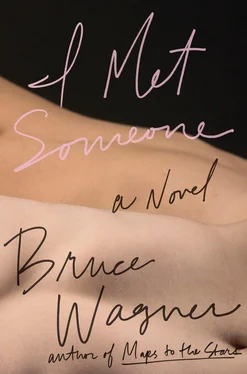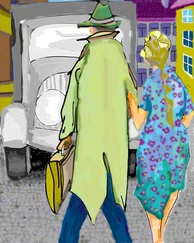Jeremy practically choked on his frittata. “But… why ?”
“Because the truth would have been too much for her.”
He thought he might die if he couldn’t hear more; he thought he might die if he heard one more word. He fought the urge to bolt.
“The truth , dear friend, was that I had a wife and son. An autistic son, as our faithful Devi so delicately described.” The giant hands clasped together again. “And I murdered them both.”
Jeremy’s heart screeched and fluttered like a defenseless thing set upon by a cat. He made lightning escape plan calculations and rejected them with the same speed; to outrun this cunning figment was a foolish, impossible enterprise. The man would hunt him down for sport.
“And after that deplorable act, I felt a rush of freedom! Some of that sense of release , no doubt, I attribute to complete shock —the shock of excitation that I was able to go through with such a thing at all , after having thought about it for so many years… you see, the thrill wasn’t in the getting away with it , but in the doing . There’s no point in speaking to the details that drove me to commit the act. Suffice to say that little Jim—‘Jimbo,’ my son — had become savagely, incurably violent, and my Margot — well, he’d effectively destroyed her, enlisted her, and now both were actively conspiring to destroy me .”
For a long moment, his gaze turned inward. The heavy, hooded lids blinked and flirted with his eyes, promising the opiated sanctuary of sleep — but were spurned.
He resurfaced and became present once more. “And when it was finished, I wondered — not What have I done? but rather What else am I capable of? Oh, that query possessed me! What else was I capable of that was beyond my power to imagine? Not in the sense of the monster-hunter becoming the monster, or the abyss staring back into me … You see, I had always favored the ‘mystical,’ Jerome — in my teenage years I was of the type who haunted the metaphysical section of booksellers, those traders who were moribund even in pre-Internet days… Well, an answer to that came (in the form of another question): Am I capable of enlightenment? And am I a “ candidate ”? It was a thought that was actually in the back of my mind a long, long while. Could murder— might murder — for me —might it be the avenue of that first step of the journey to moksha, kaivalya, nirvana? I’d read certain parables that seemed to assert an ‘enlightened murderer’ was no oxymoron, and the so-called liberated state may soon be attained through the homicidal act itself . If that were true, imagine how one’s odds at being liberated would be increased by the killing of those whom one loves and protects, one’s very own blood! Isn’t that what Krishna counsels Arjuna? That not to kill those kings and fathers — in my case, mothers and sons! — was to be impotent by sheer weakness of heart? That not to kill would incur sin? Is it not written in the Gita? The ingenious hypothesis was simple, and only in want of a ‘test phase’ to prove or disprove its worth. And I’m no sociopath, lad, far from it! Though I know the declaration encourages the rejoinder, Thou doth protest too much .
“There’s an old saying that if one is going to tell a lie — a significant lie — one must plan it as carefully as a murder. In my case, I planned the murder first and then the lie that I eventually told my Devi… what’s the lovely thing Twain said? He said so many funny, lovely things. Oh, here—‘The truth is a fragile thing but a well-told lie can live forever.’ Haha. You see, my plan was to make a getaway from far more than merely the jejune scene of the crime — it was to flee from all that I knew, and all I was known by. I chose the invisibility of homelessness because I imagine it appealed to a romantic fantasy I’d carried throughout the years of cutting anchor , divesting myself of reputation, relationships, possessions. [“I suppose the double murder accomplished that!” he said, in a chilling, theatrical aside. “Though ‘triple’ would be more accurate, as it wouldn’t be fair to leave myself out. I killed misself off as well.”] This desire to self-excommunicate , you see, was an impulse I’d had since, well, adolescence. And if it weren’t exactly spiritual enlightenment I was seeking at that time, it certainly would have been an illumination of Self — though I suppose in many quarters it’s hard to draw a distinction between the two.
“Let me interject a little something about solvency , because I have the feeling you’ve been puzzling over it. I know Devi mentioned some business about my having made arrangements vis-à-vis access to funds — which is true. Before the murders, I’d spent months stashing money away in safe-deposit boxes around the country… which the prosecution would of course use against me as evidence of premeditation, will use against me. And I shan’t argue. In fact, I shall rush to their defense! Isn’t that what Lord Krishna urged? In defense of war? To urge that one enlist in the war against Self, through the supreme act of violent surrender ?”
While unable to shake a queer, out-of-body feeling, Jeremy was pleased to have found himself comfortably settling in (or nearly so) to the sonorous rhythm of his companion’s speech. In other words, he no longer feared ambush. While listening to MacKlatchie’s words, he took in their surroundings with a preternatural attentiveness — the reactive expressions of fellow luncheoners engrossed in private conversations; the telltale gait of servers and their wry, conspiratorial whispers; the very temperature of the large, sunlit room, and its minute fluctuations therein. What’s all this? Jeremy mused, then understood: “all this”—impressions, perceptions, and feelings —were nothing more (or less) than a heightened, holy, inordinate sense of being alive. And now he saw firsthand the very thing that Devi had: a man before him who belonged to energetic royalty, exemplar of a gang whose controversial greatness could be defined by the possession of two qualities, diametrically opposed — a convivial command of the commonplace and a proficiency in the untranslatables of the dark Unknown. It was the effortless personification of those extremes that made the guru.
He spoke of the months immediately after the crime when he lived as a fugitive in Mexico. For a while he kept abreast of the frenzied stateside search for the wealthy heir who’d slain his wife and troubled son, but interest soon ebbed; the public, in its haste to make room for fresh kills and faddish reality shows, moved on. He kept a small room for a while off the Zócalo, where he took flight in profound meditation, channeling the “assemblage points” and “lucid-dreaming bodies” of his Margot and little Jim — before and after death. During one of these zazen , he came to understand (“By a truth revealed through the act of ‘reading’ energy”) that “they hadn’t died at all , because they were never born. None of us were, don’t you see, Jerome? It’s true , my friend! I always thought it was balderdash, but it’s true!” The fallacy of man, he said, was in believing anything else. “This puerile ‘doctrine of Death’—so primitive! — is man’s undoing. For I am telling you that it isn’t the thing of Death, it’s the wrongheaded idea of it that lays waste to man’s joy, his Love, his Freedom .” His work in Mexico City done, he decided to return to Minnesota, where he’d broadcast his revelations in a court of law. “Because they have to transcribe it — isn’t that marvelous? Anything I said would be permanently enshrined: transcribed by law .”
Читать дальше












